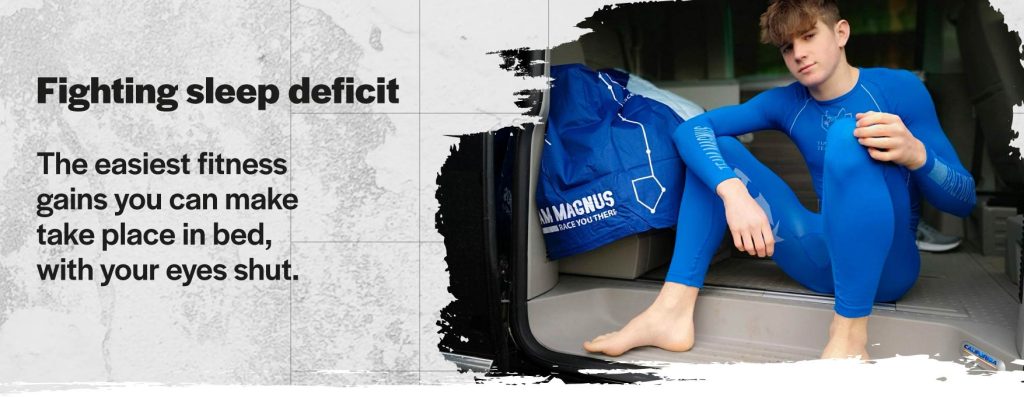You have a tonne going on and your sleep deficit is building up. Sounds familiar? Yet you make it to school, to training and you have time for shows, games and friends. Are the late nights really a problem?
Turns out, unless you aim for 8-9 hours in bed a night, the effects are massive! They range from weakening muscle mass to a wobbly moral compass. The easiest fitness gains you can make take place on your back, with your eyes shut! Before I go into the science of sleep deprivation, let’s check out what job sleeping does for us.

Make time to sleep
The ultimate muscle – your brain
No matter how advanced an athlete you are: your brain will always be your main muscle. It doesn’t contract or relax like your biceps, but you can train and develop it. And it bosses your fitness regime! Did you learn a new trick on your skateboard or a different dance move?* Everything you learned during the day has been achieved through intense neurological activity, with your brain in charge.
Any new information you absorb is temporarily stored as a memory. It is during your sleep that these memories are assessed, catalogued and organised so that they can be retrieved at will when necessary. All the unnecessary details, things that weren’t worth your attention, are thrown out in order not to clutter the memory banks. I am pretty sure you don’t remember the colour of the boots each of your opponents wore during your soccer match last month, do you?**
The majority of the scientists also agree in the “restorative theory”. Long story short, since all the systems are working at minimum, “idle” levels during sleep, the brain takes advantage of this time to inspect and repair all the parts which are in need of it. This is why you feel so refreshed after a good night of sleep!***
Last but not least, during your sleep there is a reboot of all the hormones, which for one reason or another were altered during your day (sport, stress, hunger, etc.), losing their optimal balance. And don’t forget, in your puberty hormonal balance is extremely important!****
Your 7-9 hour sleep range
Luckily, you don’t just bounce between the two states of fully awake or deep sleep. It takes 4 (some say 5) stages to really get to sleep. Through every step your heart rate slows down, your breathing becomes slower and your consciousness slips further and further away, until we reach the Rapid Eye Movement phase which you’re probably familiar with, and where all the good stuff mentioned above happens. It takes around 5 hours to reach the REM phase, and we should stay there for about a couple of hours. In your teenage years, you need to add 1 or 2 hours to the equation.*****
No reboot?
There is no need to delve into big physiology words, but basically the lack of good quality REM sleep will prevent the restoration of natural order in your body. That great reset just never happens.
Here’s a list of the negative outcomes you can avoid with a good 9 hour sleep:
More prone to lose muscle mass: due to the hormonal imbalance, your body is likely to enter a safe mode of austerity. Because muscle mass is very “costly” to maintain, it will take the hardest hit.******
- Impaired reflexes: neurones in your brain are fatigued during the day, by literally any thought that goes through your mind. If they don’t recover properly, they’ll start to be way less reactive to external stimuli and concentrate more on basic survival stuff.*******
- Attention span: School isn’t the only place where you need to concentrate! Staying focused on something for longer helps you separate whatever you deem important from what’s useless, with more discernment and better calibration, making it a lot easier to repeat and practice in the future.*******
- Craving for extra food: cravings become more likely when our body is in deficit. Low energy due to lack of sleep is erroneously associated with low caloric intake, creating a craving for your favourite food (hardly ever fruit and salad).*********
- Moral compass: research suggests that people that consistently sleep fewer hours that necessary tend to lose the ability to both judge and maintain better morality. For example, if you are sleepy all the time you will be way more likely to let down a friend or commit a foul on the pitch.**********
Pro tips for quality sleep
There isn’t some magic spell to make your sleep perfect, but we can definitely try some of the following:
- No screens for at least 30 minutes before bedtime.
- Try a relaxing, predictable routine before going to bed, enjoyable but not exciting. Podcasts are helpful, you can play music on your phone for a pre-set time, maybe gentle stretches suit you or a skin or nail routine – something soothing you don’t make time for during the day.
- Make sure your bedroom is as dark is possible.
- Aim for 7 hours for sleeping (8 would be great), even you don’t fall asleep immediately, you’ll still be relaxing.
- Try your best to get some sunlight in the morning for about 30-35 minutes, to reset your circadian rhythm (see the blog about vitamin D);
- Exercise regularly. If your body is tired, you are much more likely to fall into deeper sleep sooner.
References
*Halson S. L., Juliff L. E. (2017) ‘Sleep, sport and the brain.’, Progress in brain research, 234, 13-31.
**Poe G. R. (2017) ‘Sleep is for forgetting’. The journal of neuroscience, 37(3), 464,473.
*** Brinkman J. E., Reddy V., Sharma S. (2021) ‘Physiology of sleep.’ Treasure Island: StatPearls Publishing.
****Jenni O. G., Achermann P., Carskadon M. A., (2005) ‘Homeostatic sleep regulation in adolescents.’ SLEEP, 28(11), 1446-1454.
*****Hagenauer M. H., Perryman J. I., Lee T. M., Carskadon M. A. (2009) ‘Adolescent changes in the homeostatic and circadian regulation of sleep.’ Journal of developmental neuroscience, 31, 276-284.
******Wang X., Sparks J. R., Bowyer K. P., Youngsted S. D. (2018) ‘Influence of sleep restriction on weight loss outcomes associated with caloric restriction.’ SLEEP research society, 1-11.
*******Taheri M., Arabameri E. (2011) ‘The effect of sleep deprivation on choice reaction time and anaerobic power of college student athletes.’ Asian journal of sports medicine, 3(1), 15-20.
********Typaldos M., Glaze D. G. (unknown) ‘Teenagers: sleep patterrns and schoold performance.’ US national healthy sleep awareness project.
*********Holm S. M., Forbes E. E., Ryan N. D., Phillips M. L., Tarr J. A., Dahl R. E. (2009) ‘Reward-related brain function and sleep in pre/early pubertal and mid/late pubertal adolescents.’ Journal of adolescents Health, 45(4), 326-334.
**********Barnes C. B., Gunia B. C., Wagner D. T. (2015) ‘Sleep and moral awareness.’ European Journal of sleep research, 24, 181-188.
Further reading
Peter I. D., Adamu H., Asani M. O., Aliyu I., Umar U. I. (2017) ‘Sleep pattern and sleep hygiene practises among nigerian schooling adolescents.’ Indian journal of psychological medicine, 407- 412.
Halson S. L. (2015) ‘Stealing sleep: is sport or society to blame?’ British journal of sports medicine, 50, 381.
Faroq L., Ali A., Mahmood S., Farzand M., Masood H., Mujahid S. (2019) ‘Association between excessive use of mobile phone and insomnia among Pakistani teenagers. Cross sectional study.’ American international Journal of multidisciplinary scientific research, 5(4), 10-15.





